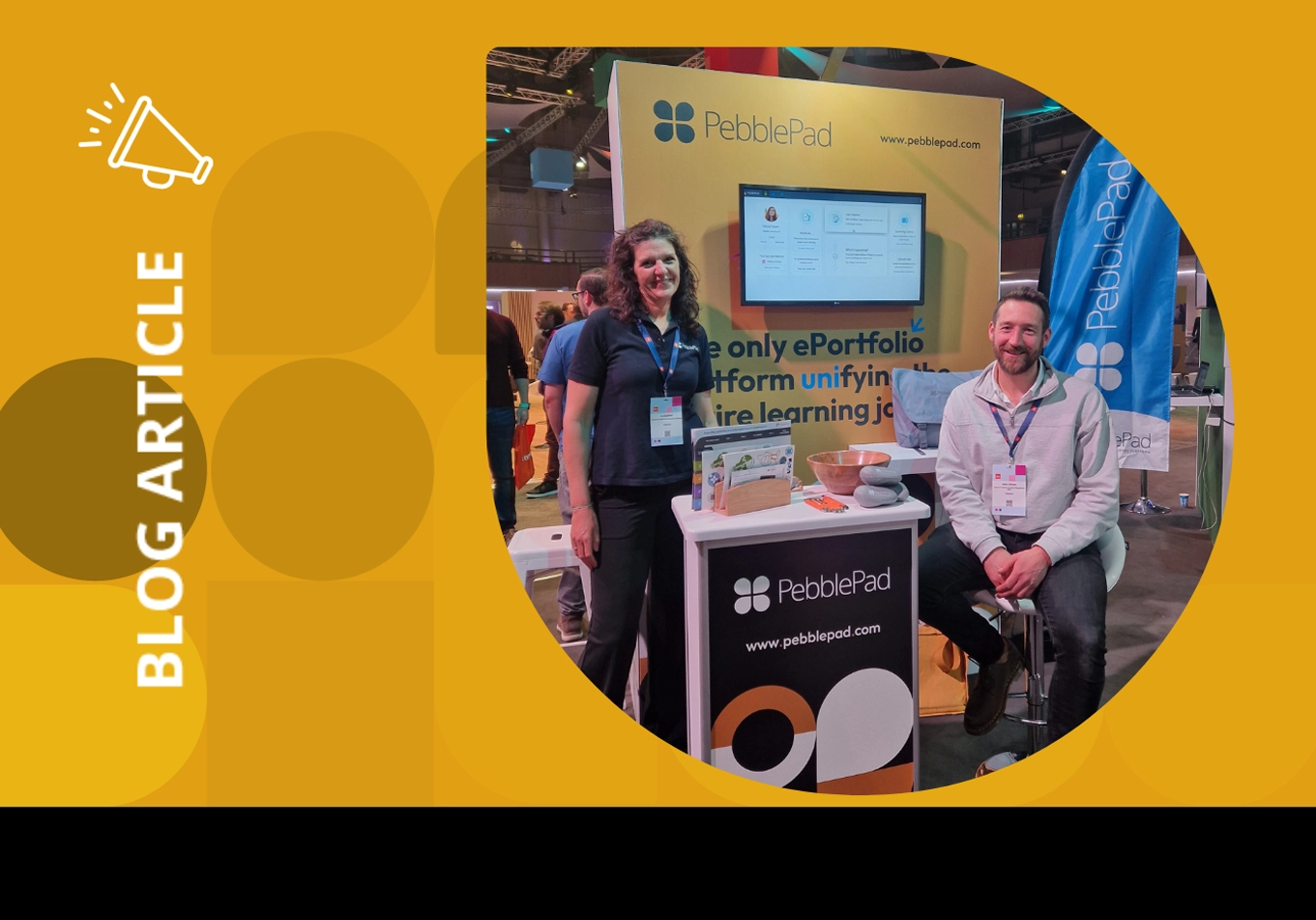At our recent Company All Hands session, we heard from Christa, a remarkable individual who has been recognised as Apprentice of the Year at the Midlands Women in Tech Awards 2023. Christa is an apprentice application developer at PebblePad and an apprentice ambassador, sharing her insights and experiences with schools and colleges across the UK.
In her presentation, “Apprenticeships Unleashed”, Christa provided a glimpse behind the scenes of her work role, giving an insight into what life is like for an apprentice in the UK. The presentation coincided with Apprentice Wednesday of National Apprenticeship Week, providing the perfect opportunity to share Christa’s story with a wider audience. We’ve captured the highlights from Christa’s presentation in a question-and-answer format below.
What job roles can you get an apprenticeship in?
In short, a lot! There are 691 approved standards and 15 routes with many job roles. To put that in context, Education Secretary, Gillian Keegan recently said nearly 70% of occupations are now accessible via an apprenticeship.
Access to a degree through an apprenticeship is opening further with medical doctor apprenticeships announced last year and teacher degree apprenticeships announced at the weekend. So, for example, for me and the other apprentices here at PebblePad, we are doing a digital and technology solutions professional degree apprenticeship. Take a gander at the full list on the Institute for Apprenticeships and Technical Education (IfATE) occupational maps.
Also, I must mention In Scotland they’re called Graduate Apprenticeships and in Northern Ireland they’re called Higher Level Apprenticeships.
How is an apprenticeship different from other types of training?
The main difference from other types of training is that you are paid whilst doing an apprenticeship and you will spend around 80% of your time is spent at work. Employers and training or learning providers are also heavily involved in your apprenticeship, mentoring you as well as applying for the relevant funding.
What do the different levels of apprenticeships mean?
You’ll see on the Apprenticeships and Technical Education website there are different levels for Apprenticeships. The apprenticeship I am doing covers levels 4, 5 and 6 of the academic levels and we are working towards a bachelor’s degree. Apprenticeships are equivalent to the academic and vocational routes; they’re all challenging in their own different ways.
The pathway for degree apprenticeships does vary. In my case, I did my GCSEs at secondary school, then I went on to a BTEC at College before starting my degree apprenticeship, but it’s different for everyone. You can have people choosing to upskill and change their career, you don’t necessarily have to be a school leaver. I know someone who was originally a dancer and now they are doing a Level 3 apprenticeship with Microsoft in Cloud Technologies.
What is the work like?
Well, it’s basically the same as any developer in the team. I work on fixing bugs, creating new features, and maintenance work, as well as other responsibilities that surround that, like planning work and creating automated tests. I’m developing real-world skills from the start, something which you wouldn’t necessarily get in the university route.
I spend 3 ½ days at work compared to 1 day at university, and I love being able to be part of the team and learning from other people who have more experience. And it’s a big part of why I’m so passionate about apprenticeships because of all the benefits of being in a work environment and being able to learn on the job.
What is the university part like?
Just because most of our time is in the workplace, the benefits of the university part can feel a little overshadowed. So, I’d like to bust that misconception. The university aspect is vital and brings so much to the degree in terms of making us well rounded individuals.
Regarding the time at university, it is one day a week. Typically, with some exceptions like this semester, those days are usually split into two, so we cover 2 modules in a day, we cover 1 module in the morning, another in the afternoon.
We do pretty much the same as a normal university student. We have lectures and workshops. The key differences are that we’re in our own cohort, and this allows us to go at our own pace. The content is similar with a few exceptions to make it more aligned to the work aspects of the apprenticeship.
The other difference is our university course is a little bit more spread out than the main normal full time university course. We’ve got a lot to pack in! Ours is four years rather than the normal course university course which is 3 years.
Do you think you’ll be pigeonholed into a particular job role?
I hear that question a lot from people who are considering doing an apprenticeship. In my experience I don’t think that is the case. It’s also why the university aspect of the apprenticeship is so important. For example, in the university course we get to cover the same topics as the normal university degree and it’s those topics don’t necessarily apply to our day-to-day work. So, for example in our second year we did a module that was around robotics. University gives important opportunities to explore other areas.
How does the university ensure you get other skills apart from on-the-job training?
My university, the University of Wolverhampton, support us to be well-rounded individuals. A key area that needs to be highlighted is the Knowledge, Skills and Behaviours (KSBs). These align to both the work aspects and on the job training, but they are not specific to software engineering. They include things like ‘how businesses exploit technology solutions for competitive advantage’. Another looks at the value of technology investments.Another looks at how teams work effectively.
These are probably what you would call soft skills and are not necessarily tied to any specialism, and you also have KSBs that do provide exposure to other areas of technology, like networking and cyber security. The university provides training on these skills, which provides more opportunities to pivot after graduating.
What can employers do to support their apprentices?
The key is making apprentices feel part of the team. PebblePad do this just generally, everyone’s voice is important. We don’t feel we are less; we feel part of the team. Our ideas and opinions are welcomed in discussions and even if a project comes in which we are unfamiliar with, the team and my manager do a fantastic job of tapping into my experience in a different way, as well as challenging us and giving constructive feedback. It makes me feel valued and that’s probably the key to supporting apprentices.
Want to know more about how PebblePad supports apprentices?
If you are researching digital platforms to support apprentices at your institution download our features and functions guide. PebblePad supports students by providing them with an online learning space to reflect and evidence the knowledge, skills and behaviours required for their apprenticeship. As well as giving apprenticeships a space to reflect on their experiences in the workplace and classroom, students can also record off-the-job activity, progress reviews and tag evidence to demonstrate how they have applied learned knowledge, skills and behaviours in the workplace. Want to know more? – see how Newcastle Business School supports their degree apprenticeship learning journey.


















